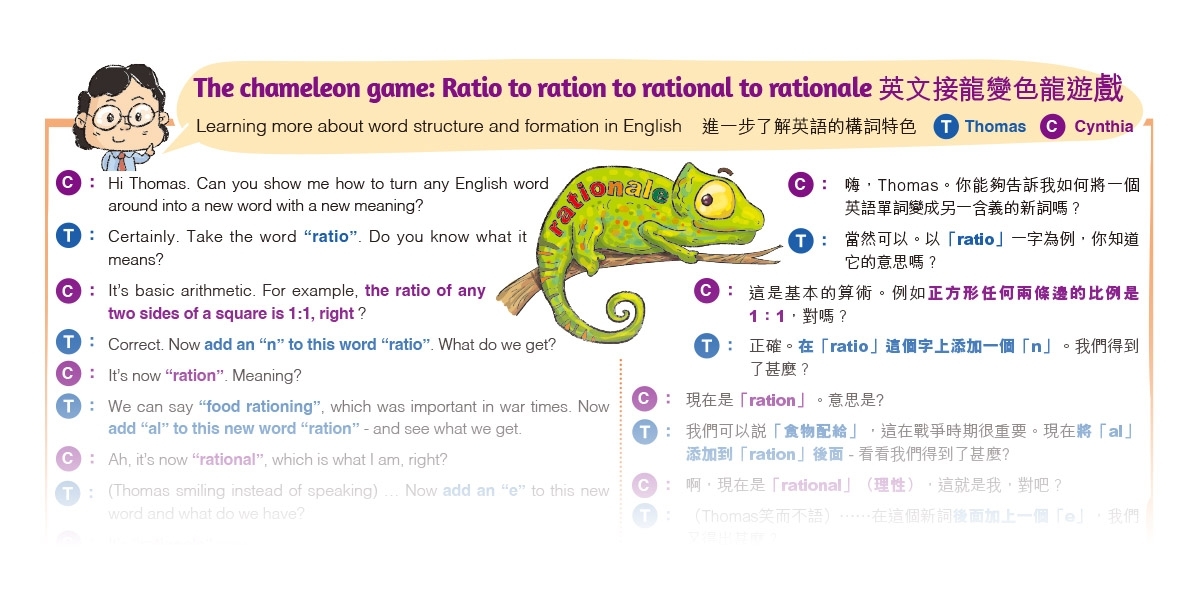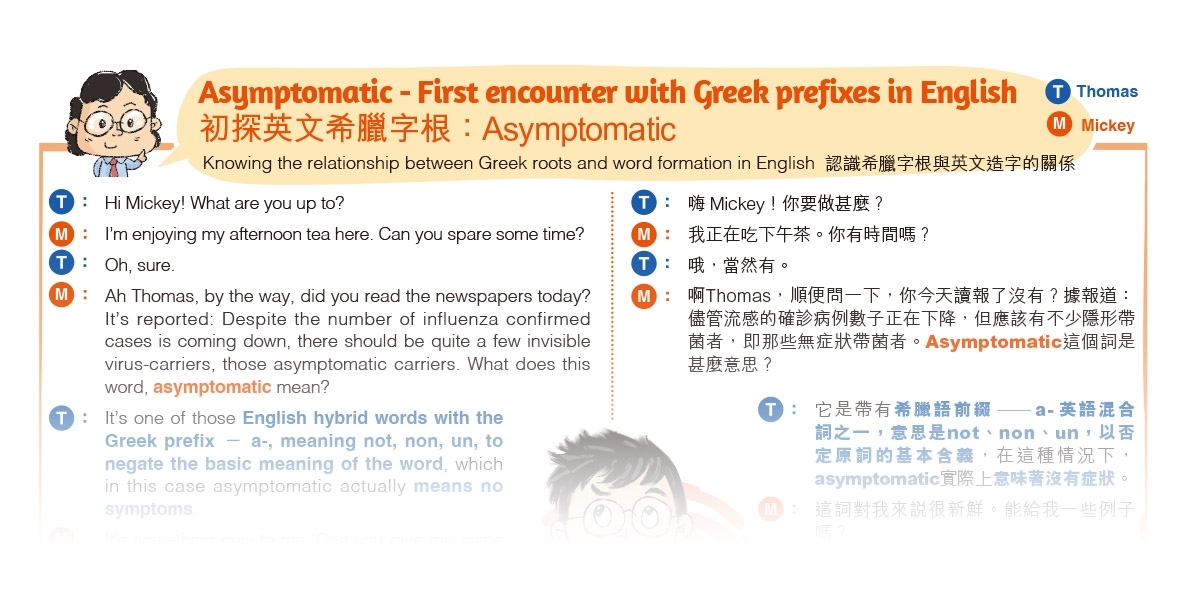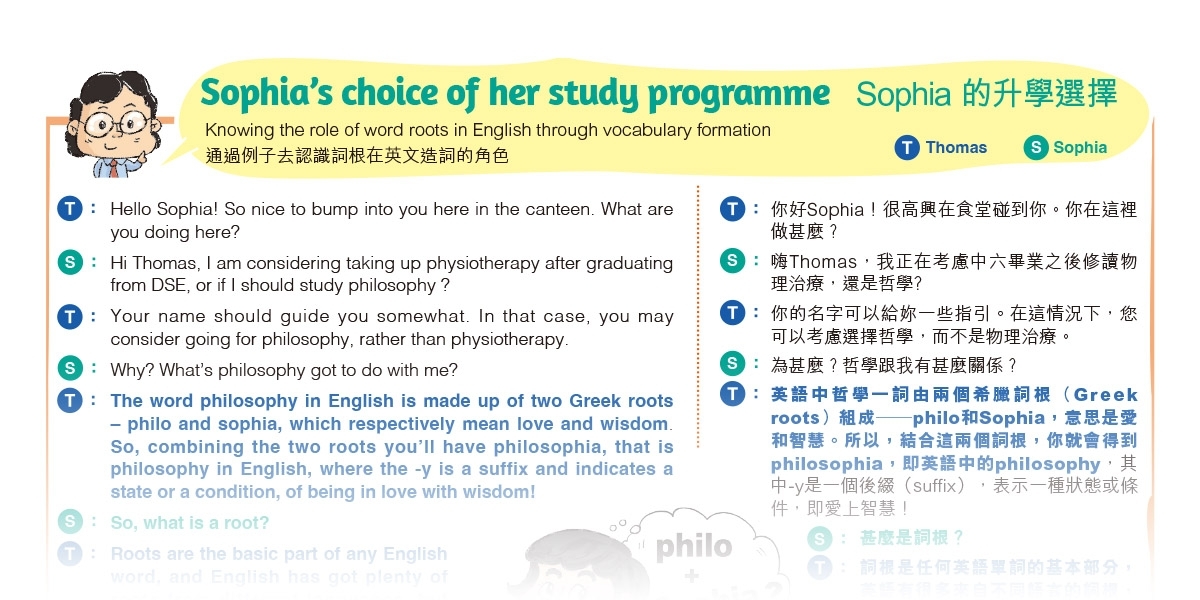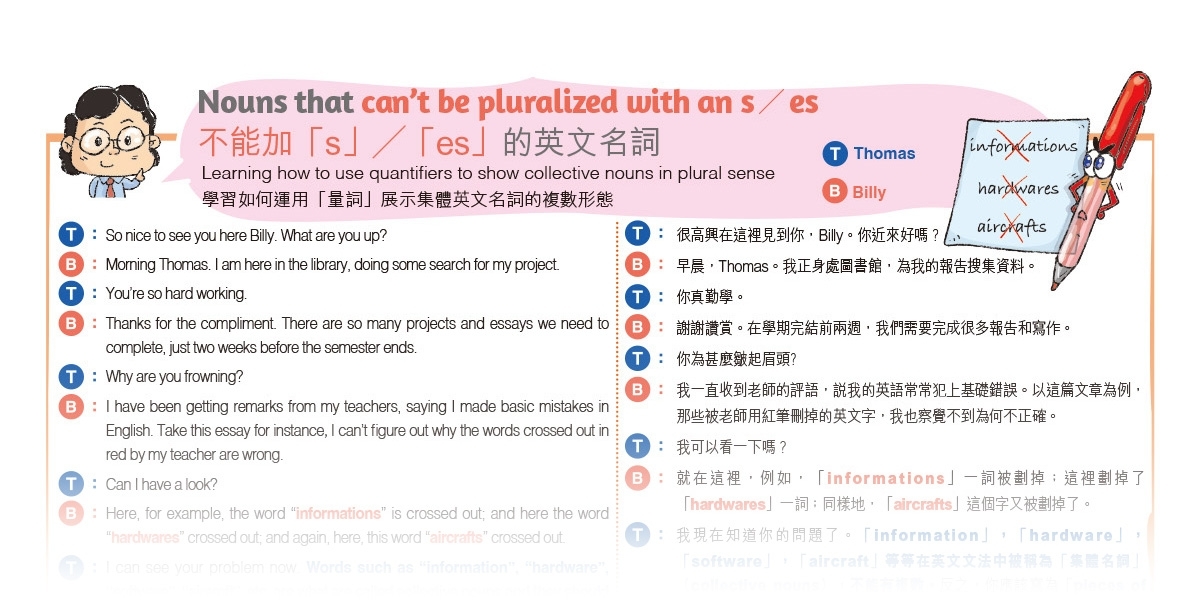昔日文章


Learning English with Thomas
2023.06.04
The chameleon game: Ratio to ration to rational to rationale
英文接龍變色龍遊戲
Learning more about word structure and formation in English 進一步了解英語的構詞特色
T : Thomas | C : Cynthia
C: Hi Thomas. Can you show me how to turn any English word around into a new word with a new meaning?
T: Certainly. Take the word “ratio”. Do you know what it means?
C: It’s basic arithmetic. For example, the ratio of any two sides of a square is 1:1, right ?
T: Correct. Now add an “n” to this word “ratio”. What do we get?
C: It’s now “ration”. Meaning?
T: We can say “food rationing”, which was important in war times. Now add “al” to this new word “ration” - and see what we get.
C: Ah, it’s now “rational”, which is what I am, right?
T: (Thomas smiling instead of speaking) … Now add an “e” to this new word and what do we have?
C: It’s “rationale” now.
T: We’re actually on word formation in English. All we need to do is to first of all get a word root ready, and add something to its last letter, in which case it’ll be a suffix. That way, the basic meaning will be modified or even completely changed.
C: Ah, word structure and formation isn’t that complicated as I thought… (Thomas smiling again, instead of speaking)
C: 嗨,Thomas。你能夠告訴我如何將一個英語單詞變成另一含義的新詞嗎?
T: 當然可以。以「ratio」一字為例,你知道它的意思嗎?
C: 這是基本的算術。例如正方形任何兩條邊的比例是 1:1,對嗎?
T: 正確。在「ratio」這個字上添加一個「n」。我們得到了甚麼?
C: 現在是「ration」。意思是?
T: 我們可以說「食物配給」,這在戰爭時期很重要。現在將「al」添加到「ration」後面 - 看看我們得到了甚麼?
C: 啊,現在是「rational」(理性),這就是我,對吧?
T: (Thomas笑而不語)⋯⋯在這個新詞後面加上一個「e」,我們又得出甚麼?
C: 現在是「rationale 」(理由)。
T: 我們剛觸及英語構詞。我們需要做的就是首先準備好一個詞根, 然後在其最後一個字母中添加一些字母,在這種情況下,它就是後綴。這樣,基本含義就會被修正甚至完全改變。
C: 原來英語構詞不是我想像中那麼複雜。(Thomas 再次笑而不語)


Learning English with Thomas
2023.05.21
Asymptomatic - First encounter with Greek prefixes in English
初探英文希臘字根:Asymptomatic
Knowing the relationship between Greek roots and word formation in English
認識希臘字根與英文造字的關係
T : Thomas |M : Mickey
T: Hi Mickey! What are you up to?
M: I’m enjoying my afternoon tea here. Can you spare some time?
T: Oh, sure.
M: Ah Thomas, by the way, did you read the newspapers today? It’s reported: Despite the number of influenza confirmed cases is coming down, there should be quite a few invisible virus-carriers, those asymptomatic carriers. What does this word, asymptomatic mean?
T: It’s one of those English hybrid words with the Greek prefix - a-, meaning not, non, un, to negate the basic meaning of the word, which in this case asymptomatic actually means no symptoms.
M: It’s something new to me. Can you give me some examples?
T: Sure. I can think of the following, to start with: asymmetrical; atypical and even abnormal, where the ab is a variation of a.
M: Wow! I haven’t come across something like these.
T: Haha! It’s time you should read more books.
T:嗨 Mickey!你要做甚麼?
M: 我正在吃下午茶。你有時間嗎?
T: 哦,當然有。
M: 啊Thomas,順便問一下,你今天讀報了沒有?據報道: 儘管流感的確診病例數子正在下降,但應該有不少隱形帶菌者,即那些無症狀帶菌者。Asymptomatic這個詞是甚麼意思?
T: 它是帶有希臘語前綴 —— a- 英語混合詞之一,意思是not、non、un,以否定原詞的基本含義,在這種情況下, asymptomatic實際上意味著沒有症狀。
M: 這詞對我來說很新鮮。能給我一些例子嗎?
T: 當然可以。首先,我可以想到以下幾點:不對稱(asymmetrical);非典型的(atypical);冷漠(apathy);甚至異常(abnormal),其中ab是a的變體。
M: 哇!我從沒有接觸過這些詞。
T: 哈哈,你是時候要多看書了!


Learning English with Thomas
2023.03.24
Sophia’s choice of her study programme
Sophia 的升學選擇
Knowing the role of word roots in English through vocabulary formation
通過例子去認識詞根在英文造詞的角色
S : Sophia
T: Thomas
T: Hello Sophia! So nice to bump into you here in the canteen. What are you doing here?
S: Hi Thomas, I am considering taking up physiotherapy after graduating from DSE, or if I should study philosophy ?
T: Your name should guide you somewhat. In that case, you may consider going for philosophy, rather than physiotherapy.
S: Why? What’s philosophy got to do with me?
T: The word philosophy in English is made up of two Greek roots – philo and sophia, which respectively mean love and wisdom. So, combining the two roots you’ll have philosophia, that is philosophy in English, where the -y is a suffix and indicates a state or a condition, of being in love with wisdom!
S: So, what is a root?
T: Roots are the basic part of any English word, and English has got plenty of roots from different languages, but mostly from Latin and Greek.
By the way, you know, getting to know quite a few such roots will take you a long way towards expanding your English vocab.
T: 好Sophia!很高興在食堂碰到你。你在這裡做甚麼?
S: 嗨Thomas,我正在考慮中六畢業之後修讀物理治療,還是哲學﹖
T: 你的名字可以給妳一些指引。在這情況下,您可以考慮選擇哲學,而不是物理治療。
S: 為甚麼?哲學跟我有甚麼關係?
T: 英語中哲學一詞由兩個希臘詞根(Greek roots)組成——philo和Sophia,意思是愛和智慧。所以,結合這兩個詞根,你就會得到 philosophia,即英語中的philosophy,其中-y是一個後綴(suffix),表示一種狀態或條件,即愛上智慧!
S: 甚麼是詞根?
T: 詞根是任何英語單詞的基本部分, 英語有很多來自不同語言的詞根, 但主要來自拉丁語和希臘語。順帶一提,你要知道,多了解這些詞根會對你在擴展英語詞彙方面大有幫助。


Learning English with Thomas
2023.01.15
Nouns that can’t be pluralized with an s ╱ es
an s ╱ es 不能加「s」╱「es」的英文名詞
Learning how to use quantifiers to show collective nouns in plural sense
學習如何運用「量詞」展示集體英文名詞的複數形態
T : Thomas B : Billy
T : So nice to see you here Billy. What are you up?
B : Morning Thomas. I am here in the library, doing some search fo rmy project.
T : You’re so hard working.
B : Thanks for the compliment. There are so many projects and essays we need to complete, just two weeks before the semester ends.
T : Why are you frowning?
B : I have been getting remarks from my teachers, saying I made basic mistakes in English. Take this essay for instance, I can’t figure out why the words crossed out in red by my teacher are wrong.
T : Can I have a look?
B : Here, for example, the word “informations” is crossed out; and here the word “hardwares” crossed out; and again, here, this word “aircrafts” crossed out.
T : I can see your problem now. Words such as “information”, “hardware”, “software”, “aircraft”, etc. are what are called collective nouns and they should not be pluralized. Instead, you should write “pieces of information”. For “hardware” you’d say “hardware systems”; and for “aircraft” you’d say “units of aircraft”. Such nouns in English usage need quantifiers to show a plural sense.
B : I see. That’s something I must bear in mind from now on. Thanks so much for the explanation.
T : 很高興在這裡見到你,Billy。你近來好嗎?
B : 早晨,Thomas。我正身處圖書館,為我的報告搜集資料。
T : 你真勤學。
B : 謝謝讚賞。在學期完結前兩週,我們需要完成很多報告和寫作。
T : 你為甚麼皺起眉頭﹖
B : 我一直收到老師的評語,說我的英語常常犯上基礎錯誤。以這篇文章為例, 那些被老師用紅筆刪掉的英文字,我也察覺不到為何不正確。
T : 我可以看一下嗎?
B : 就在這裡, 例如, 「i n f o r m a t i o n s 」一詞被劃掉; 這裡劃掉了 「hardwares」一詞;同樣地,「aircrafts」這個字又被劃掉了。
T : 我現在知道你的問題了。「information」,「hardware」, 「software」,「aircraft」等等在英文文法中被稱為「集體名詞」(collective nouns),不能有複數。反之,你應該寫為「pieces of information」。至於「hardware」,您可以用「hardware systems」(硬件系統);而「aircraft」可以說成「units of aircraft」(飛機單位)。這些名詞,在英文運用上,要加上「量詞」(quantifiers)才能量化。
B : 原來如此。我今後必須牢記這些的知識。非常感謝您的講解。






